The world of composing for film and television continues to become more exciting as new musicians, composers, ears and creative minds enter the field from all different avenues.
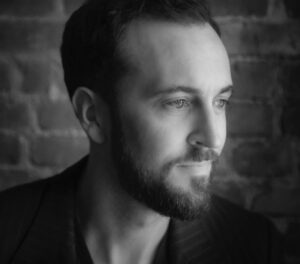
Jeremy Turner has been composing for various media for a little over ten years but has been particularly busy with his work for the Netflix series Five Came Back and Immigration Nation. This year, Turner broke into the lucrative world of Marvel Studios with the Disney+ series, Marvel 616, a series of documentaries about Marvel characters in the real world. Turner wrote the theme song for the show and provides the music for Episode 4 titled Lost and Found, the episode directed and starring Paul Scheer as he goes about trying to find some “lost” Marvel characters that he can turn into an animated series for Marvel and Disney.
Below the Line spoke with Turner over the phone for the lively conversation below:
Below the Line: I’d love to know about your background and how you got started in music and then composing. Are you from New York?
Jeremy Tuner: I used to be. I lived in New York for about 20 years and went to Julliard there, played in an orchestra there, started my composing career there, but I moved to California, I guess that was 2014 I think, so it’s been about six years. I came into composing as a career pretty late, honestly. I had a whole career as a performer before. I grew up in Michigan, but played piano and cello, did musical theater and all kinds of stuff, sports and whatever. Cello, very clearly, was the main thing for me, and I ended up going to Julliard for that. Then I joined the Metropolitan Opera orchestra when I was about 21. I played as assistant principal cello in the orchestra there, so I played in the orchestra for 14 years actually. It was awesome, It was an incredible dream come true, and then after four or five years, it started becoming like Groundhog Day. I realized how lucky I was to have that job. I know people would kill for that, but I think because I got it so young and didn’t have a family or a mortgage, I had the freedom to start exploring other ideas. Fundamentally, I had a creative itch that needed to be scratched. Even though I was playing masterpieces every night, I really wanted to create and make things, so I started writing music. At first, it was just commercials, and then some short films. I was sort of living this dual life where I was kind of starting to write during the day and then playing at the opera at night. I was using all my salary and everything to fuel this new career path. I even had a band and played gigs downtown. It was really kind of like a Batman-Bruce Wayne kind of thing. I’d take off the tuxedo and then hop in a cab and run downtown and grab a guitar and sing on stage and stuff like that. It was pretty funny. Eventually, it came time to make a decision, so I left the orchestra when I was 36 I think — that would have been nine years ago. I put all my eggs in one basket and started writing, and here we are.
BTL: I looked over the list of people you’ve played with like David Byrne, LCD Soundsystem, The National, which is a pretty amazing line-up of rock musicians.
Turner: Yeah, that was all part of the journey for me. When I first started in the orchestra, word kind of gets out — there used to be a lot more film score recording in New York than there is now, I think. I started getting calls like, “Hey, there’s this new young cellist. Let’s see if we can get him on some recording sessions.” I played on scores for Howard Shore and Carter Burwell and Danny Elfman and people like that back in my early 20s. That was kind of an eye-opening experience for me, because I saw how the machine worked, and I saw what it took and was very interested in that. Naturally, when bands would come to town, whether it was to play on Saturday Night Live or whatever, I would often get called to do that stuff. There’s a fine line between people that are classically-trained but you can insert them into an indie band or rock and roll band or, whatever it happens to be. There’s a fine line between just doing it and actually being able to feel and groove and all that kind of stuff. I always felt, myself personally, as a bit of a musical chameleon. I was always very happy and comfortable to be dropped into pretty much any situation and just make it work. But yeah, all those things put together kind of fueled my interest for expanding my musical horizons and moving into composing ultimately.
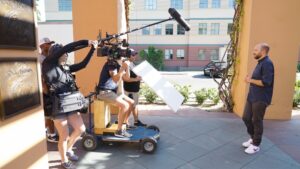
BTL: It sounds like you’ve worked with some great composers, so like you say, that must have been a great way to get some idea what it’s like being on that side of things.
Turner: Definitely, definitely. I mean, I think with anything, all of your experiences, regardless of what you do, help inform, whether it’s your writing or if you’re a chef or whatever. Playing in the opera orchestra and playing on film scores and playing in bands, it’s all part of the makeup, the experiences and the memories that help fuel me when I’m composing.
BTL: You seem to have done a mix of indie movies, television and documentaries, and you seem to have found a niche on the documentary side of things with Five Came Back and now Marvel 616. What was the journey composing for these different things for which music is needed?
Turner: What’s interesting that I’ve found and I’m still pretty early on in my composing career, I would say, relatively speaking, but I found that Hollywood, whatever that is or what it means, is so quick to put people into boxes. Are you a comedy guy? Are you a drama guy? Are you a TV guy? Are you a film guy? And it just doesn’t work for me. 2019, I was doing some romantic comedies and some light indie films and stuff. Two years before that was Five Came Back, which was this huge orchestral dramatic score done in the tradition of the classic film scores back in the day. For one reason or another, this past year has been very documentary-heavy, but at the end of the day, regardless of the genre or the style that you’re writing for, to me, music is just this universal language, and there’s just tons of different dialects. It just depends on who I’m writing for, but I approach every project more or less the same way, whether it’s a dramatic film or a documentary, I’m paying attention to the characters in them and the development of those characters and what’s happening and then just trying to find a way to accentuate that storytelling with with music.
BTL: I’m not sure how it is for musicians, but I think for actors, when they get the call to do a Marvel movie, they think that they can stop doing all the indie movies. You wrote a theme for Marvel 616 rather than just scoring one episode. How did that come about?
Turner: That part was very exciting. I was was very honored that they asked me to do that, and it was really fun to write the main titles. I don’t think I’m gonna quit my day job or say “no” to other opportunities, per se. [laughs] But yeah, I know what you mean. I’m married to an actress, and when you see Marvel and Disney calling you, it certainly gets your heart racing a little bit.
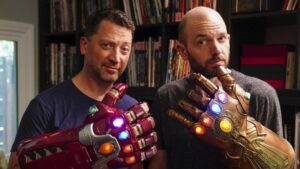
BTL: I think that Marvel has somewhat of a musical style now, and sometime in the last few years, they’ve even added a theme for its logo sequence.
Turner: Yeah, for sure. I think a lot of that groundwork was definitely laid by Alan Silvestri, and Danny Elfman, and I thought Mark Mothersbaugh did a fantastic job with Thor Ragnarok. It’s funny, because the Marvel sound of the films and all that fans have gotten accustomed to and used to is this big, heroic epic, orchestral action-adventure sound, which is really fun for me to dive into. That kind of sound and expectation, while it’s been morphed and it’s evolved over time, you could go all the way back to John Williams doing Superman, and some of those early, early superhero films –Danny Elfman’s first score for Batman. It’s definitely a fun sound for me to dive into, and there’s no place I feel more comfortable then writing for orchestra, so it was really fun to get the chance to do that.
BTL: Did that just flow right into doing Paul Scheer’s episode? How was that decided?
Turner: When they first asked me if I wanted to write the main title, I said, “Yeah, absolutely,” jumped at the opportunity. It was always kind of understood that I would do one of the episodes as well. Which one we weren’t entirely sure, but Paul’s episode was one of the first I think to be made. Shortly after I finished the main titles, Paul’s was kind of getting further into post-production, and it just seemed like a natural fit. Paul’s stuff was fun to work on, especially as a composer. I used everything including the kitchen sink for that one. There’s a little bit of everything in there. There’s theremin and lap steel guitar and the using the orchestra, even though it was done with kind of a wink and a nod, I could still lean into that big heroic superhero sound, because of what was going on in Paul’s head as he’s creating the greatest documentary ever. That kind of thing. So that was really fun.
BTL: He definitely takes a more humorous approach to finding these characters that I think maybe one in 500 people watching it might have ever heard of it. I used to have a lot of comics but I don’t even remember them.
Turner: Oh, there’s some really deep cuts in that episode. They dug way into the archives for some of those, but that was part of the fun of it, too, bringing that stuff to light. Deadpool, obviously, is a very META approach that Ryan Reynolds has taken to that, breaking the fourth wall, and Paul really took it to even another level – it’s like fifth, sixth, seventh wall. It was just collapsing on top of itself by the end, taking this Marvel property and re-pitching it back to Disney. It was very funny. I think people will get a kick out of that.
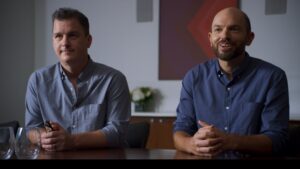
BTL: What sort of direction did he give you? Obviously, it’s meant to be humorous but you kept it pretty faithful to the music in the more serious bigger Marvel movies.
Turner: Yeah, Paul was a delight to work with. Things were pretty far along with the shooting when I first started writing, and we had a really easy time working together. There was very few notes — it seemed like we were kind of speaking the same language right out of the gate, and then we got to celebrate up at Skywalker when we’re doing the final mix, which was was fun to finally meet in person.
BTL: So you got to do a lot of this before COVID hit and before everything was shut down?
Turner: Yeah, luckily, my portion on this show, both the main titles and the episode that I worked on, that was all completed at the end of last year before all this hit, but I know at least half, if not more, of this series done during COVID I think.
BTL: How have your own experiences been dealing with COVID? I assume you can write at home but have you gone out to record either yourself or with an orchestra in the last few months?
Turner: Yeah, I have. We did our first orchestra recording during COVID a couple months ago. I was very fortunate to have a back log of projects to work on this year when all this stuff hit, so I felt very lucky to have that. After the writing finishes, and the putting it all together — the recording and the production — that part definitely, as with anybody, presented new challenges. How do you tell wind and brass players that they can’t blow. In terms of just safety measures, how the configuration of an orchestra in a studio and how it’s recorded, and suddenly, they have to be further apart, and then that changes how you set up the mics. There’s so many hoops that we had to jump through. There was an episode I did of Chef’s Table — the sound of the episodes that I did was a string quartet, a clarinet and a guitar, and it was meant to have this very intimate, small room, everybody in the same room together sound. Obviously, that was something we couldn’t do, so we had to get really creative with how we recorded it, who we were able to call and play and then use various tricks with post audio and score mixing to make sure that it all had the feeling of… it was sort of the musical version of green screen, I guess, making it sound like it was all done in the same room, even though it very definitely was not.
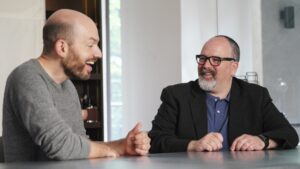
BTL: I come from a music engineering background, so for me, if I can get more isolation between instruments? Great!
Turner: I think for some of that stuff, especially for bands, the more isolation the better. I think where it presents challenges is when you’re trying to get that group sound of a string session or something like that. I would imagine, as with everybody, learning how to evolve and shift during this time of a pandemic and lock-downs and all that kind of stuff, everybody has to get creative. You might have your first call of, “Oh, I want these musicians,” but I think very quickly, musicians are learning, if they don’t already, they’ve got to figure out how to get some mics at home and set-up whatever they can, so that they can keep working.
BTL: I spoke with Michael Giacchino recently, and he was telling me about recording his album with every musician recording their bits separate and at home, but you could never tell because it sounds like it was recorded at Abbey Road or someplace like that.
Turner: It really is incredible what in this modern age that people are able to create. Even the stuff that I’ve done, and I know what happened, I know how it was recorded, I listen to it and even to my ears, it doesn’t sound any different. I’ve been very lucky that way.
BTL: You touched upon this earlier, but I was curious about scoring for documentary vs. narrative or even scoring a movie vs. a TV series, some of the challenges or benefits of one over another.
Turner: You know, it’s always a challenge no matter what. [laughs] I think part of the thing you have going for yourself with a series… earlier this year, I did Immigration Nation for Netflix, which was six hours of episodic television, and I think it had like five and a half hours of score. Certainly, the more you have to create, the more challenging it is, but you also are able to really develop themes and really have things evolve. You just have more runway to experiment with. It’s kind of a double-edged sword. As much of a joy as it is to be able to have that freedom and see things through a long form, when you’re creating that much music, it’s also that you’re creating that much music. It’s an uphill climb, but no, whether it’s movie or TV or documentary or narrative, honestly, for me, I approach everything more or less the same way. You’re still ultimately writing music to help tell the story. Sometimes, you might have to do some heavy lifting. Maybe the edit or the take or the performance wasn’t exactly as strong as the director might have wanted it to be, so the music has to carry a little bit more. The inverse of that is if you’re working with Daniel Day Lewis or something, you don’t need to do much. It just depends. I would say my approach, regardless of the medium, is always more or less the same, which is just to help tell the story.
BTL: When you’re writing, are you a computer guy who uses lot of MIDI instruments or do you still sit at a piano and write out charts?
Turner: All of the above. Because I come from a classical background, if I need to write parts or write charts, I certainly can. When it gets to orchestral sessions and things like that, I have a copyist, music prep people that I work with, that I can pass the MIDI to, just because that’s such a time-consuming process. That way I can stay focused on continuing to write, but I have some vintage synthesizers, I’ve got seven or eight guitars, I’ve got my cello. I’ve got two pianos. It’s a musical exploration room, for sure. I’ve got quite a few things at my disposal and like I said, because I came from a performance background, I will try to play as much as I can, not only for time’s sake, but if I’m able to execute something in the way that I hear it, certainly I’ll do that. If it comes to, “Hey, can you play this killer drum beat?” That’s when I start calling friends, because I’m a terrible drummer. [laughs]
You can catch Turner’s work on Marvel 616, specifically Episode 4 “Lost and Found,” which is now streaming on Disney+.





